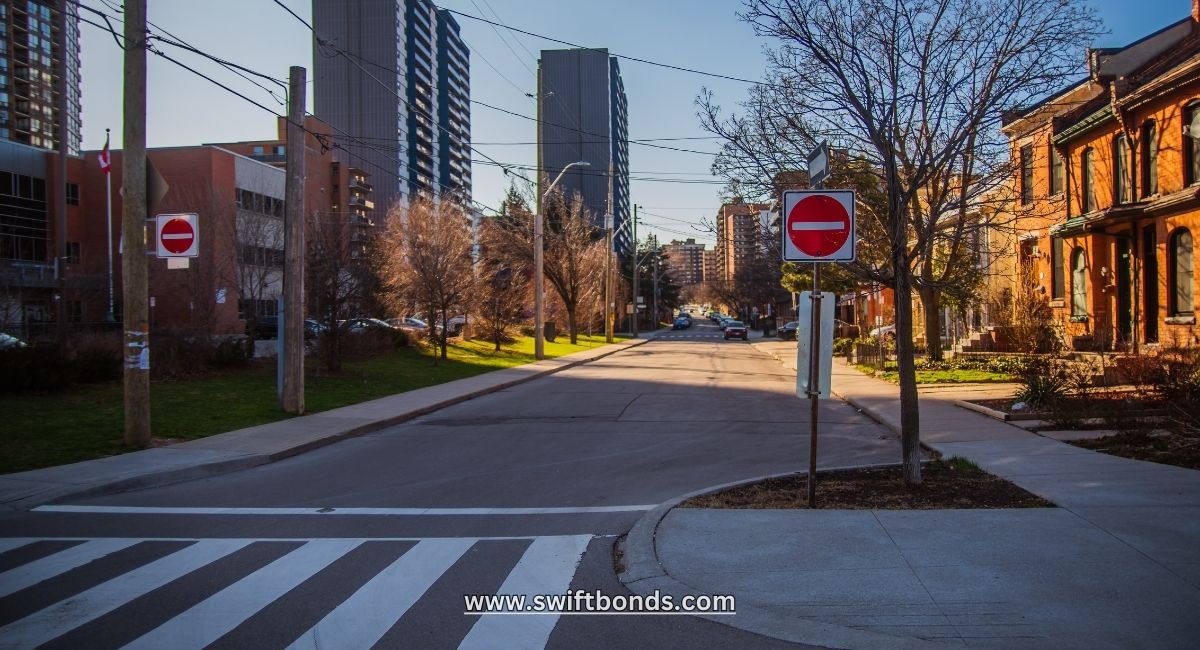Get an Instant Quote on Right of Way Permit Bond
Introduction
From our perspective, contractors working in public areas throughout Missouri want their projects to move forward without delays, confusion, or costly missteps. In Lake Saint Louis, right of way work—like digging near roadways or installing utilities—requires city oversight. One requirement that stands out is the City of Lake Saint Louis, MO – Right of Way Permit ($5,000) Bond. This bond acts as a safeguard, making sure public spaces are protected when construction work occurs. It also provides the city financial assurance that any damage will be corrected, either by the contractor or through a claim on the bond.
This bond is especially helpful for small to medium-sized projects, as it meets the city’s minimum requirement while keeping costs manageable. It covers issues such as restoration of sidewalks, curbs, and streets after completion of work. While it may not be as complex as the City of Kansas City, MO - Right of Way Performance and Maintenance Bond, which often covers larger projects with extended maintenance periods, it still plays a critical role in showing that a contractor takes responsibility for their work. For anyone doing construction within city rights of way, understanding this bond is the first step toward getting permits approved and projects started.
Many Contractors Misunderstand Local Bonding Requirements
We’ve noticed that contractors sometimes assume that a permit is all they need. Others think that a general liability policy is enough. This often leads to delays when the city rejects a permit application because the required bond is missing. A right of way permit bond, like the one required in Lake Saint Louis, is a separate document. It serves a different purpose than insurance—it’s not about protecting the contractor, but about protecting the city’s property.
Another common misunderstanding is confusing this bond with others used in nearby cities. For example, the City of Moberly, MO - Concrete/Sidewalk/Right of Way ($10,000) Bond may look similar, but the bond amounts and scope differ. Lake Saint Louis focuses on smaller, short-term work, which is why the bond amount is $5,000. That doesn’t mean it’s less important. If sidewalks aren’t restored properly or a project is abandoned mid-way, the city may file a claim to cover the cost of repairs. Understanding how this bond functions helps contractors avoid costly disputes and keeps city staff confident in approving permit applications.

Swiftbonds Provides Clear, Reliable Support
Based on our experience, Missouri contractors benefit most when working with a provider that not only issues bonds, but also understands local permitting rules. Swiftbonds helps contractors meet bond requirements in cities across the state, from Lake Saint Louis to Kansas City. Whether you're applying for the City of Lake Saint Louis, MO – Right of Way Permit ($5,000) Bond, the City of Kansas City, MO - Right of Way Performance and Maintenance Bond, or even the City of Moberly, MO - Concrete/Sidewalk/Right of Way ($10,000) Bond, Swiftbonds ensures each document meets the city’s specific formatting and legal standards.
Swiftbonds issues bonds quickly—often in under 24 hours—and confirms all city-required terms are met. That includes maintenance periods, renewal terms, and language about restoration responsibilities. More importantly, Swiftbonds walks each contractor through what the bond guarantees, how it fits into the permit process, and what to expect after submission. That kind of guidance prevents confusion, especially when working across multiple jurisdictions that all have slightly different rules.

Steps To Get The Right Bond In Lake Saint Louis
What we’ve discovered is that contractors who follow a repeatable process have the least trouble with bonding and permitting. If you're seeking a right of way permit in Lake Saint Louis, here’s how to meet the bonding requirement correctly:
-
Check your permit type: Visit the Public Works section of the City of Lake Saint Louis official website or contact the city clerk to confirm whether your scope of work triggers the bond requirement.
-
Request the bond form: The city typically provides a sample or template of the bond they require. Make sure you use their version—altering the wording may result in rejection.
-
Apply for the bond with Swiftbonds: Submit basic business details, contractor license information, and project scope to Swiftbonds for fast processing.
-
Receive and sign the bond: Once approved, you’ll receive the bond to sign and attach to your permit application.
-
Keep a copy on file: Submit the original to the city and retain a copy for your records in case follow-up inspections or claims occur.
By following this plan, you not only meet Lake Saint Louis’s expectations but also streamline the path to project approval.

Why Partnering With Swiftbonds Pays Off
We’ve found that contractors working with Swiftbonds reduce paperwork problems, avoid rejected applications, and receive permits faster. Bond language matters—cities like Lake Saint Louis often require specific legal phrases in their bond forms. Submitting an outdated or incorrect version can stall your permit.
Swiftbonds regularly works with Missouri municipalities and is familiar with their most current forms and requirements. Contractors benefit from this hands-on experience and don’t have to waste time interpreting fine print or navigating complex legal terms. This is especially helpful when managing multiple city permits—whether you're working on a small sidewalk repair under the City of Moberly, MO - Concrete/Sidewalk/Right of Way ($10,000) Bond, or a major utility line project covered by the City of Kansas City, MO - Right of Way Performance and Maintenance Bond. No matter the city, Swiftbonds offers consistency and clarity.

The Cost Of Getting It Wrong
In our observation, failing to submit the correct bond—or skipping it altogether—can stop a project cold. In Lake Saint Louis, right of way work without an approved bond on file is not allowed. That means no trenching, no boring, no concrete removal. If a project begins before the bond is accepted, the city may issue fines or even stop-work orders.
The city also reserves the right to claim against the bond if the work is incomplete or poorly restored. For example, if a contractor finishes the project but leaves broken curbs behind, the city can use the bond to pay for repairs. That’s why it’s so important to understand what your bond covers and how long it's active. Mistakes in these areas can hurt your reputation, especially if you plan to bid on future work in the area.
The Advantage Of Being Prepared
We’ve learned that contractors who take bonding seriously tend to build stronger relationships with city officials. When you arrive with the correct bond in hand, it signals professionalism. It shows that you’re not cutting corners and that you're committed to protecting public property. That kind of credibility can speed up inspections, reduce permit review times, and open the door to future project approvals.
With the City of Lake Saint Louis, MO – Right of Way Permit ($5,000) Bond, you show the city that your work will be done properly and restored to their standards. With Swiftbonds as your partner, you get more than a bond—you get expert support at every step, from application to renewal. Whether you're working in Lake Saint Louis, Moberly, or Kansas City, understanding your bond requirements gives you a competitive edge.
Missouri Construction Law And Performance Bond Compliance
Missouri’s performance bond regulations are governed by the Missouri Little Miller Act (Mo. Rev. Stat. § 107.170). This law requires contractors on public works projects exceeding $50,000 to post performance and payment bonds. While smaller municipal bonds—like those in Lake Saint Louis or Moberly—may fall below that threshold, cities still retain the right to require permit bonds to safeguard public infrastructure.
The City of Lake Saint Louis Public Works Department enforces bonding rules for right of way permits. Their bond form specifies that the $5,000 bond guarantees proper completion of the work and restoration of city property. Contractors must use the city’s version of the form and ensure it is signed and sealed by a licensed surety.
Contractors should confirm the bond’s term and any maintenance obligations, as cities like Kansas City often require bonds to remain active long after work concludes. You can find city-specific requirements on Lake Saint Louis’s official site or by contacting the city’s Community Development office directly.
Conclusion
We’ve come to appreciate that getting the right bond isn’t just a formality—it’s part of earning the trust of local governments and completing projects without hiccups. The City of Lake Saint Louis, MO – Right of Way Permit ($5,000) Bond is your ticket to work in city-controlled areas, ensuring that you meet restoration standards and protect the city’s interests. With Swiftbonds guiding the process, contractors can focus on the job itself—whether that’s in Lake Saint Louis, under the City of Kansas City, MO - Right of Way Performance and Maintenance Bond, or through a City of Moberly, MO - Concrete/Sidewalk/Right of Way ($10,000) Bond requirement. Swiftbonds brings speed, accuracy, and peace of mind—so you can work confidently and build your reputation.
Frequently Asked Questions
What does the $5,000 Right of Way Permit Bond guarantee?
It guarantees that the contractor will complete right of way work properly and restore public property afterward. If they don’t, the city can claim the bond to pay for repairs.
How long is the bond valid?
The bond typically lasts for the duration of the project. The city may require it to remain active through final inspections or restoration approval. Always check with the city.
Is this bond the same as the Kansas City bond?
No. The City of Kansas City, MO - Right of Way Performance and Maintenance Bond covers larger projects and includes post-completion maintenance terms. Lake Saint Louis uses a smaller $5,000 bond focused on restoration.
Can I use a generic bond form?
No. The City of Lake Saint Louis requires its official form. Submitting a generic or altered version may lead to delays or permit rejection.
Who is responsible for posting the bond?
The licensed contractor or developer performing the right of way work must post the bond before the city will issue a permit.


